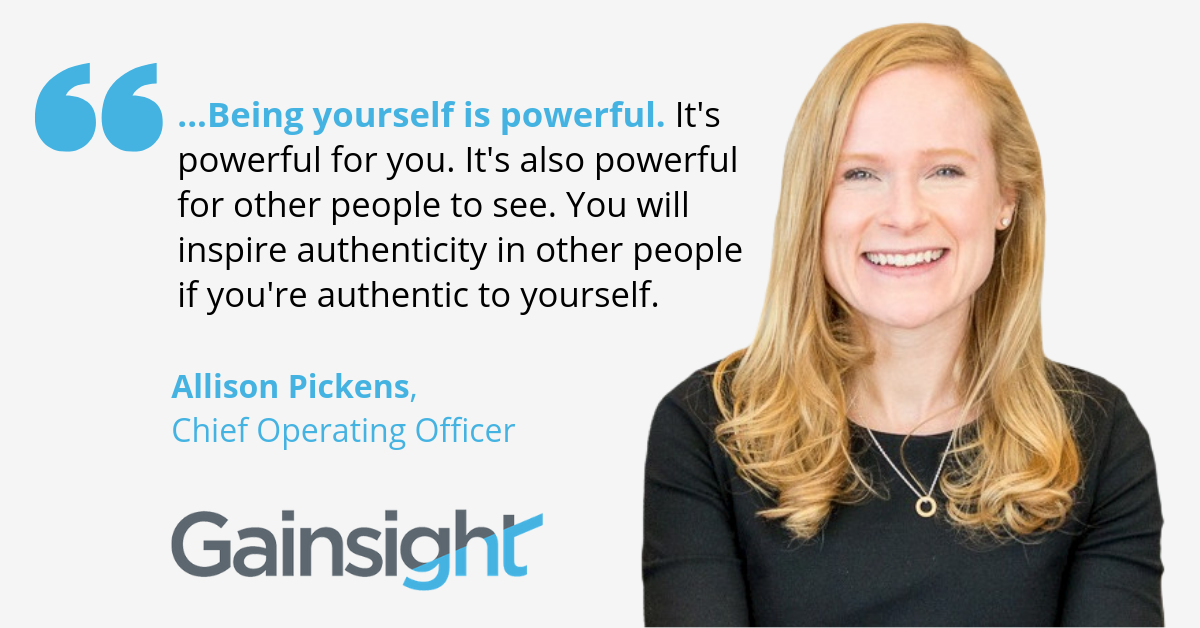When it comes to women's path to the C-suite, lack of representation is just one of many barriers to entry.
Working at a company founded and led by two women, I know I'm lucky to have examples of strong female leadership to look up to.
Most of my peers are not so lucky, and it's certainly the first time I've found myself in this position - it's no wonder why, given that only 6% of CEOs and 25% of executives are women.
I believe strongly in the power of representation - and in the power of stories.
So after chatting with Allison Pickens, Chief Operating Officer at Gainsight, about Customer Success, I couldn't resist the opportunity to ask her about her own path to the C-suite and what she'd recommend to other women hoping to reach C-level roles.
Want to learn how to become an executive? Here are Allison's recommendations.
---
What advice would you give to women looking to elevate their careers?
If you're looking to rise in your career, make sure that you're working for someone who you have a lot of respect for and who is not just going to be a friendly boss, but who will advocate for you. You should work for someone who's in your camp, fully recognizes your growth potential, and wants to help you grow over time.
What would you recommend to women interested in taking on a C-level role at some point?
Develop general leadership skills. I think there's a certain set of general leadership skills that apply to any function. For example, you need to learn:
- How to manage a difficult conversation.
- How to communicate with different audiences, whether they be investors with a financial mindset, individual team members, your boss, or peer executives. You have to know how to cater to your audience.
- How to motivate yourself through tough times and develop your own emotional self-awareness and control.
How would you recommend learning these skills?
- Go to a business school that gives you hands-on experience in working on your interpersonal awareness and abilities.
- Read books.
- I've read so many different biographies of leaders throughout history. Biographies help you find examples of situations that might be analogous to what you're going through, so that you can brainstorm ideas for how to get through it.
- Have someone in your network who is a peer coach and can be a sounding board to you during challenging situations.
- Find a peer who can coach you not by giving advice, but by asking thoughtful questions and who you can coach in return so it becomes a reciprocal relationship. You might meet once a month with this person to work through your latest tough situation, and do the same for your partner.
- When you're at the VP level or higher, get an executive coach.
- This is someone who can function much like a peer coach, but is trained on how to do it. They can give you suggestions of tactics that you might pursue and ask you an even more thoughtful set of questions.
- Become an expert on your function by learning as much as you can from other people's experiences.
- You should always look to be the best person for your role. In other words, if your boss were to start a new recruiting search to fill your role right now, would they still pick you? Your answer to that might change over time. It might be that your company has doubled in size and now your role requires a different skill set, so you've got to be able to evolve with your company. Sometimes just staying in the same role as your company changes requires you to promote yourself by upgrading your own skills. You can upgrade your skills by asking detailed questions to more experienced leaders who theoretically could replace you in your job.
What's the hardest lesson you've had to learn as a woman navigating your career and ultimately reaching the C-suite?
The most important thing that I've learned and am continuing to learn is to be authentic to my style no matter what the situation is. I think when you're in an environment where there aren't as many women, or regardless of who you are, where there are not as many people like you, it can be tempting to try to conform to the norm.
That might help you in the short term, but it's going to set you back in the long-term because if you're not true to yourself, you may not end up on the right path for you. You have to stay true to your personal purpose, your personality, and reinforce for yourself on a regular basis that you've got to show up as the best version of you.
Can you share a technique you've used to be a more authentic version of yourself at work?
I think it starts sometimes with the smallest things. Earlier in life, I was in a job where I was virtually the only woman on my team. Although I wasn't fully conscious of it at the beginning, I felt pressured to dress like the men.
Everyone around me wore black or gray pants and a button-down shirt. So I wore black pants and a button-down — basically the women's analog for the male uniform. One day I thought, why am I dressing like this? Certainly that's a fine way for women to dress, but it wasn't my style. I like wearing dresses and bright colors. So I went to a department store and shopped for dresses. I showed up the next day wearing a dress. My boss at the time was a woman, and she also dressed with the standard button-down look. She looked at me and said, "Your dress looks great." Then she went out and bought a few dresses herself! That was incredible validation for me that being yourself is powerful.
It's powerful for you. It's also powerful for other people to see. You will inspire authenticity in other people if you're authentic to yourself.
The outfit example is more superficial, but I think it's important symbolically. An even more substantial example of being yourself in a work environment is expressing your point of view. And especially sharing stories of things that you've experienced. I think it's very important that we have women's voices present in our companies, and even more importantly, in our society. If we can speak up about our perspective in a work environment, I think it will help our companies improve. It will help our society improve as well.




